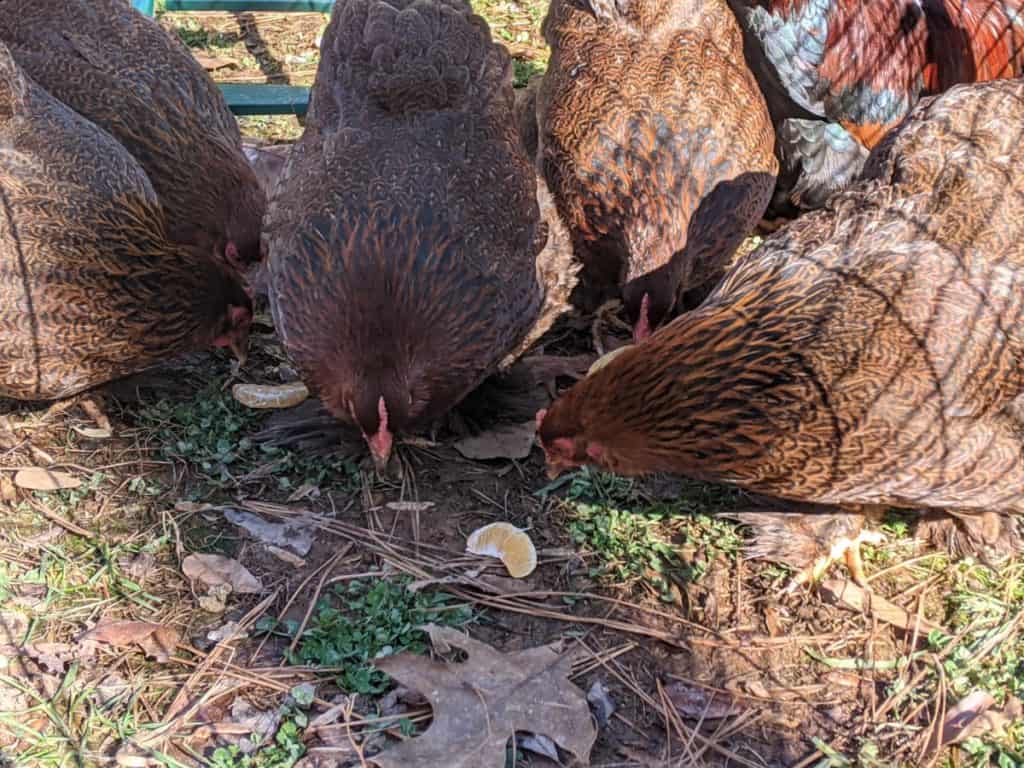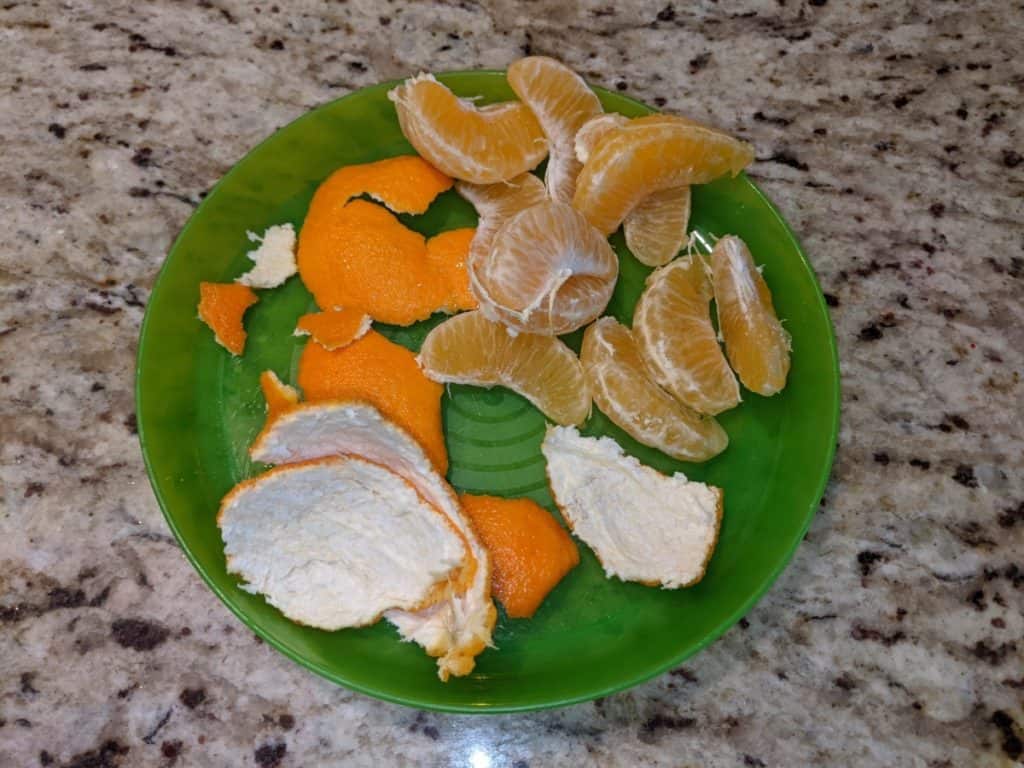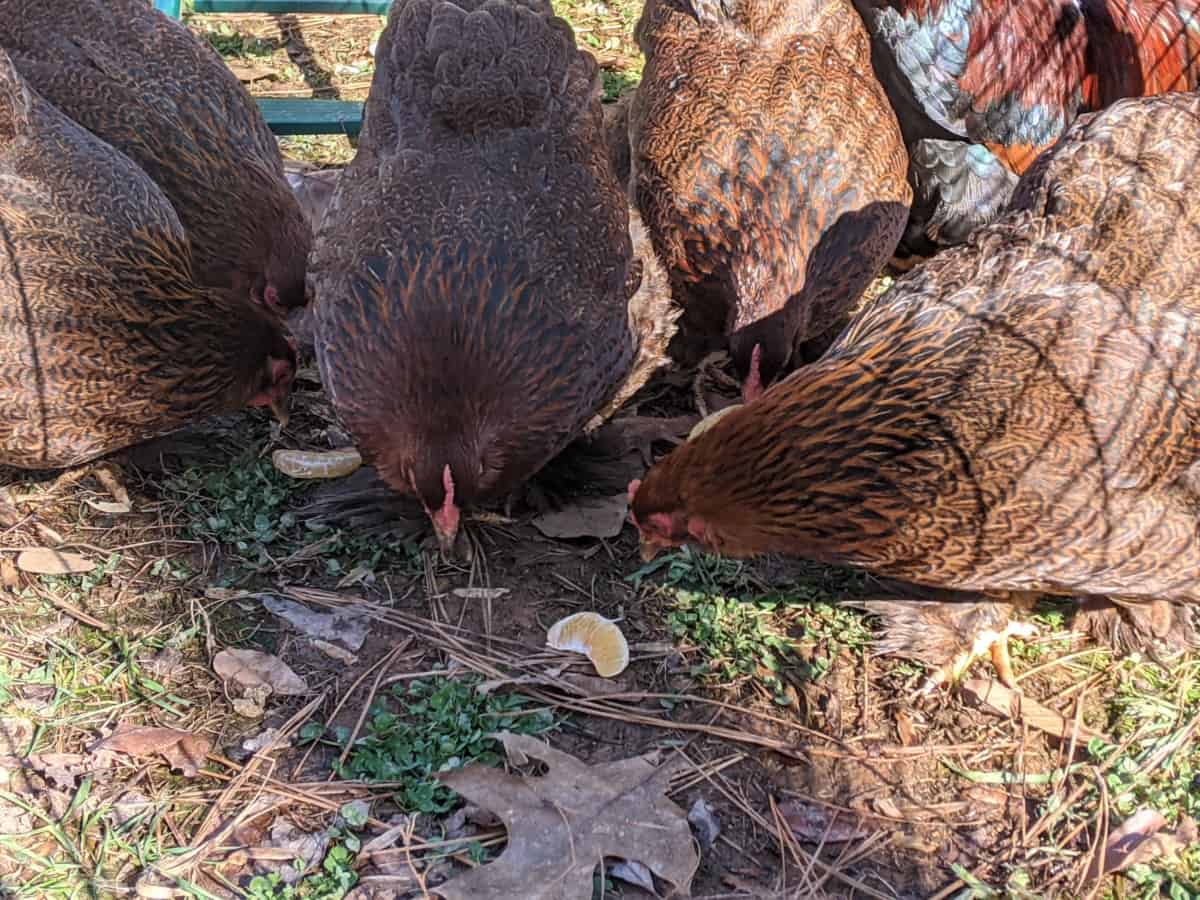
There is some debate out there on whether chickens can eat citrus. There have been reports of poor egg production, feather plucking, and other issues.
Feeding a chicken too much of any type of fruit can lead to problems. There are certain foods chickens can not eat.
I had to know where these just myths concerning citrus? Or were they backed by scientific research?
I decided to do some research and this is what I found.
Can Chickens eat citrus? Yes, chickens can eat citrus in small amounts. Citrus fruits contain citric acid which studies show improves the ability of a chicken to digest food. Citrus can also improve feed efficiency, and reduce the number of pathogens in a chicken’s stomach. Too much citrus can also alter the taste of the eggs hens lay giving them an unpleasant taste.
Large amounts of citrus pulp are a by-product of creating juices for human consumption. This excess citrus can be pressed into food pellets a sold to farmers to feed livestock and poultry.
The rind of citrus fruit and pulp is beneficial to livestock and poultry when you feed it to them. This is because it can lower the number of harmful bacteria found in the GI Tract.
Can chickens have citric acid?
Yes, chickens can have citric acid (CA). Citric acid is often used to promote growth in broiler chickens that are raised for meat consumption. The citric acid reduces the number of pathogens, improves the digestibility of nutrients, and will acidify the contents of the gastrointestinal tract in chickens.
According to the European Poultry Science (EPS) feeding chickens, 30 mg of citric acid in their diet also showed improvements in feed efficiency.
Can chickens eat oranges?
Yes, chickens can eat oranges. Studies have shown the citric acid found in oranges has health benefits for chickens in small amounts. The citric acid will help chickens digest food better and also reduces pathogens.
It can be hit or miss if your Chickens will like eating oranges usually but you can try mixing some in their food. The last time I feed oranges to my flock one hen gobbled a slice and the rest of the orange slices just sat there not being eaten.
Be aware that feeding your chickens too many oranges could alter the taste of your eggs. Farmers have been known to use food pellets containing citrus when they are raising chickens for meat.
Oranges also contain vitamin C which can be helpful if your chickens are stressed out due to heat. Chickens can make their own vitamin C by synthesizing it in their kidneys under normal conditions.
There is no direct dietary requirement to feed vitamin C to them unless they are experiencing heat stress.

Can chickens eat orange peels?
Chickens can eat orange peels. That doesn’t mean your chickens will eat the peels. Orange peels are tough and hard to peck apart for consumption. The citric acid found in the orange peel can aid in the digestion of nutrients in a chicken’s stomach.
When I feed my chickens some small pieces of orange peel they just pecked at it a few times and did not eat it.
If you really want your chickens to eat orange peels you can use a food processor to cut up the peels into smaller pieces. Then mix them in with another food the chickens prefer.
Make sure you wash the orange peels though as pesticides or other containment could be on the peel.
This should ensure that they eat at least some peel if not all of it. The citric acid found in the peal can also reduce pathogens according to some studies.
Can chickens eat citrus leaves?
Chickens can eat citrus leaves as they are non-toxic. Some chickens love munching down on citrus leaves. My chickens don’t care for the leaves of my lemon tree.
Can chickens eat tangerines?
Chickens can eat tangerines despite the myths you may have heard. Tangerines contain citric acid which aids in digestion. Tangerines also contain vitamin C which helps chickens experience heat stress.
Can chickens eat lemons?
Chickens can eat lemons. Lemons contain as much as 8% citric acid according to the US library of medicine. Studies show that citric acid is beneficial to chickens in small amounts. Eating lemons and other types of citrus can kill harmful bacteria in your chicken’s stomach.
Lemons contain 30 mg of vitamin C on average per fruit which helps your chickens if they are experiencing heat stress.
Can chickens eat lemon peels?
Chickens can eat lemon peels. If you feed your chicken large lemon peels they probably won’t eat them. You can you chop them up or use a food processor to cut them up into smaller amounts.
Lemon peels contain citric acid which improves your chicken’s ability to digest food.
Wash the peels before feeding them to your flock.

Can chickens eat grapefruit?
Yes, chickens can eat grapefruit, but they probably won’t like it. The citric acid can be helpful to your hens. You could try feeding them the dry pulp which may give you better success.
Personally, I have fed grapefruit to my chickens in the past, and they wanted no part of it.
Can chickens eat kumquats?
Chickens can eat kumquats. Kumquats are a part of the citrus family of fruits are safe to feed your chickens. Kumquats contain large amounts of vitamin C. That doesn’t mean your chickens will want to eat them, however.
Can chickens eat clementines?
Chickens can eat clementines. Clementines contain citric acid which is beneficial to chickens. The fruit is safe to feed your chickens. Similar to oranges your chickens may or may not like eating them.
Conclusion
The myth is busted! The research shows you can feed your chickens citrus. Just as with any fruit given to your flock do so in moderation.
Feeding your chickens too many citrus fruits can lead to high amounts of citric acid. The citric acid in small quantities is healthy for your chickens but too much can have negative effects.
If you plan to feed your chickens citrus peels make sure they are not moldy. Mold poses health risks to your flock. If you have given your chickens some orange peels, and they aren’t eating them toss them into the compost pile instead. Don’t let them sit around and mold.

